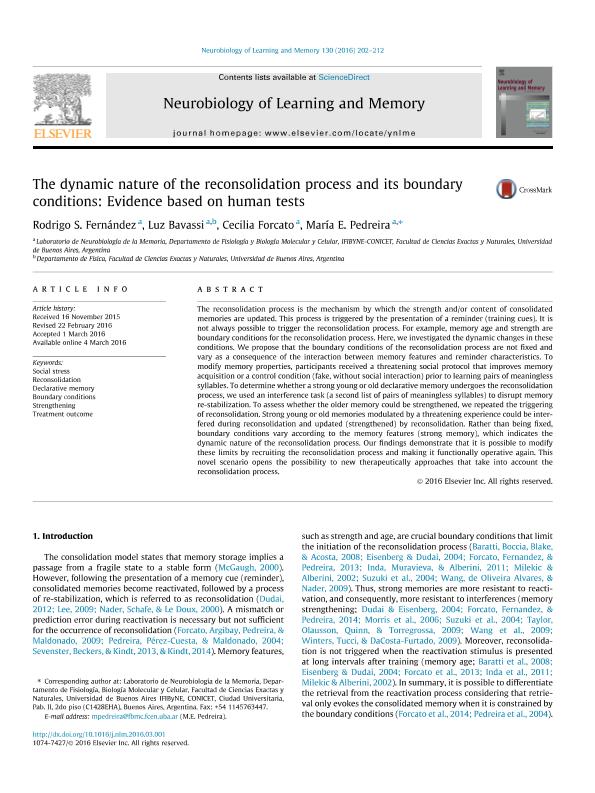Mostrar el registro sencillo del ítem
dc.contributor.author
Fernández, Rodrigo Sebastián

dc.contributor.author
Bavassi, Mariana Luz

dc.contributor.author
Forcato, Cecilia

dc.contributor.author
Pedreira, Maria Eugenia

dc.date.available
2018-09-20T13:07:44Z
dc.date.issued
2016-04
dc.identifier.citation
Fernández, Rodrigo Sebastián; Bavassi, Mariana Luz; Forcato, Cecilia; Pedreira, Maria Eugenia; The dynamic nature of the reconsolidation process and its boundary conditions: Evidence based on human tests; Academic Press Inc Elsevier Science; Neurobiology of Learning and Memory; 130; 4-2016; 202-212
dc.identifier.issn
1074-7427
dc.identifier.uri
http://hdl.handle.net/11336/60369
dc.description.abstract
The reconsolidation process is the mechanism by which the strength and/or content of consolidated memories are updated. This process is triggered by the presentation of a reminder (training cues). It is not always possible to trigger the reconsolidation process. For example, memory age and strength are boundary conditions for the reconsolidation process. Here, we investigated the dynamic changes in these conditions. We propose that the boundary conditions of the reconsolidation process are not fixed and vary as a consequence of the interaction between memory features and reminder characteristics. To modify memory properties, participants received a threatening social protocol that improves memory acquisition or a control condition (fake, without social interaction) prior to learning pairs of meaningless syllables. To determine whether a strong young or old declarative memory undergoes the reconsolidation process, we used an interference task (a second list of pairs of meaningless syllables) to disrupt memory re-stabilization. To assess whether the older memory could be strengthened, we repeated the triggering of reconsolidation. Strong young or old memories modulated by a threatening experience could be interfered during reconsolidation and updated (strengthened) by reconsolidation. Rather than being fixed, boundary conditions vary according to the memory features (strong memory), which indicates the dynamic nature of the reconsolidation process. Our findings demonstrate that it is possible to modify these limits by recruiting the reconsolidation process and making it functionally operative again. This novel scenario opens the possibility to new therapeutically approaches that take into account the reconsolidation process.
dc.format
application/pdf
dc.language.iso
eng
dc.publisher
Academic Press Inc Elsevier Science

dc.rights
info:eu-repo/semantics/openAccess
dc.rights.uri
https://creativecommons.org/licenses/by-nc-nd/2.5/ar/
dc.subject
Boundary Conditions
dc.subject
Declarative Memory
dc.subject
Reconsolidation
dc.subject
Social Stress
dc.subject
Strengthening
dc.subject
Treatment Outcome
dc.subject.classification
Otras Ciencias Biológicas

dc.subject.classification
Ciencias Biológicas

dc.subject.classification
CIENCIAS NATURALES Y EXACTAS

dc.title
The dynamic nature of the reconsolidation process and its boundary conditions: Evidence based on human tests
dc.type
info:eu-repo/semantics/article
dc.type
info:ar-repo/semantics/artículo
dc.type
info:eu-repo/semantics/publishedVersion
dc.date.updated
2018-09-19T16:38:16Z
dc.journal.volume
130
dc.journal.pagination
202-212
dc.journal.pais
Estados Unidos

dc.description.fil
Fil: Fernández, Rodrigo Sebastián. Consejo Nacional de Investigaciones Científicas y Técnicas. Oficina de Coordinación Administrativa Ciudad Universitaria. Instituto de Fisiología, Biología Molecular y Neurociencias. Universidad de Buenos Aires. Facultad de Ciencias Exactas y Naturales. Instituto de Fisiología, Biología Molecular y Neurociencias; Argentina
dc.description.fil
Fil: Bavassi, Mariana Luz. Consejo Nacional de Investigaciones Científicas y Técnicas. Oficina de Coordinación Administrativa Ciudad Universitaria. Instituto de Fisiología, Biología Molecular y Neurociencias. Universidad de Buenos Aires. Facultad de Ciencias Exactas y Naturales. Instituto de Fisiología, Biología Molecular y Neurociencias; Argentina
dc.description.fil
Fil: Forcato, Cecilia. Consejo Nacional de Investigaciones Científicas y Técnicas. Oficina de Coordinación Administrativa Ciudad Universitaria. Instituto de Fisiología, Biología Molecular y Neurociencias. Universidad de Buenos Aires. Facultad de Ciencias Exactas y Naturales. Instituto de Fisiología, Biología Molecular y Neurociencias; Argentina
dc.description.fil
Fil: Pedreira, Maria Eugenia. Consejo Nacional de Investigaciones Científicas y Técnicas. Oficina de Coordinación Administrativa Ciudad Universitaria. Instituto de Fisiología, Biología Molecular y Neurociencias. Universidad de Buenos Aires. Facultad de Ciencias Exactas y Naturales. Instituto de Fisiología, Biología Molecular y Neurociencias; Argentina
dc.journal.title
Neurobiology of Learning and Memory

dc.relation.alternativeid
info:eu-repo/semantics/altIdentifier/url/http://www.sciencedirect.com/science/article/pii/S1074742716000599
dc.relation.alternativeid
info:eu-repo/semantics/altIdentifier/doi/http://dx.doi.org/10.1016/j.nlm.2016.03.001
Archivos asociados
